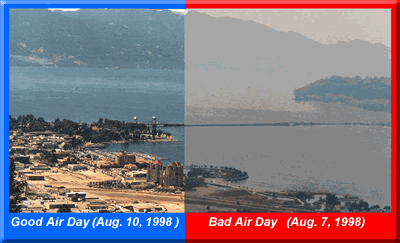

|
|
|
Planning for Clean Air Kelowna,
British Columbia With the population expected to grow by 50% in British Columbia’s Okanagan Valley over the next 20 years, there is serious planning underway to make sure the air stays clean while the area grows. Recent monitoring data shows that the Central Okanagan has one of the worst ground level ozone problems in the country, rivaling that of Toronto and worse than Vancouver. This problem is due to large traffic volumes within a valley that helps trap air pollution. It is precipitated by sunny, warm weather during the spring and summer months. Monitoring data in the North Okanagan shows that it has the second worst particulate problem in BC. It comes from the smoke caused by burning at homes, and by local industry. This air monitoring data has shown that the communities within the Okanagan Valley must work together to preserve and improve air quality in the Okanagan Airshed. The Okanagan Air Quality Committee, consisting of politicians from the North, South and Central Okanagan, is a coalition of Millennium Eco-Communities hard at work on an Okanagan Air Quality Management Plan. This Plan is the blueprint of actions needed to preserve the airshed. In other words, it is a plan for clean air. The objectives of the Plan are to cooperate with local governments and agencies in protecting air quality, to encourage senior levels of government to increase the level of air quality monitoring throughout the Okanagan Valley, and to take action on reducing emissions within the Okanagan Airshed. Among the activities are an emphasis on public transit and other forms of transportation, air quality education within schools and community groups, encouraging a switch to cleaner fuels, and the successful development of a backyard burning ban. This spring, events in the Central Okanagan include a two day Environmental Expo with over 50 exhibitors, an Environmental School Challenge involving 22 schools, a heavy duty vehicle emissions clinic, a light duty vehicle emissions clinic (one of the biggest in Canada) and the Go Green Challenge which encourages business and communities to use alternative forms of transportation. With growth comes more people, and with more people come increased activities that can contribute to air pollution. By planning for the next 20 years, the Okanagan Air Quality Planning Group is making sure there is clean air in the future!
|
